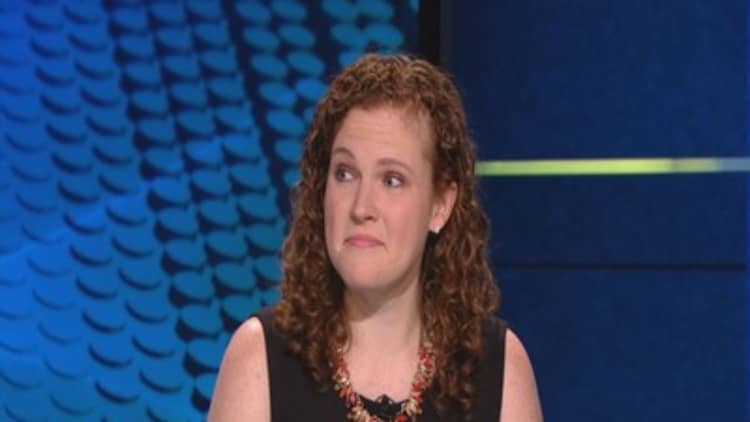
Are millennials risk-averse? Well, yes and no.
"Yes, absolutely," said Marguerita Cheng, certified financial planner and CEO of Blue Ocean Global Wealth. "I don't like to generalize, but I have witnessed this firsthand.
"Some younger investors … are extremely risk averse because they have seen their parents lose their jobs, lose equity in their homes and experience stock market declines after 9/11, Enron and the global financial crisis," she added.
While there is no consensus on the definition of millennials, also known as Gen Y, a Council of Economic Advisors study defines these individuals as those born between 1980 and 2004. (Click here to download the study.)
How does Cheng's firm address the challenges presented by this cohort?
"It can be a tough sell," she said. "From their perspective, their lives have been very turbulent, as it has taken a long time for many of them to get jobs and they have student loans."
She emphasizes the need for investor education, explaining to risk tolerance and risk capacity to these younger clients.
"Their plan has to help them get comfortable handling risk, and it needs to be as flexible and dynamic as their lives are," Cheng said.
To support this flexibility, the plan must incorporate a consistent source of income and saving for certain pursuits and needs, such as student loans, emergency funds and "experiences" such as travel.
"We position [investing] as building wealth to do the things that are important to you," Cheng said. "Retirement can't be the first thing we mention."
Other side of the coin
"Are they risk-averse? No way," said Shane Yonston, CFP and principal advisor with Impact Investors.
"But they trust themselves more than they trust the system; i.e., Wall Street," he said. "They have a feeling of empowerment, with an ethos of 'We can do it ourselves.'
Read MoreAdult kids can be a drain
"That's why, in general, they want to be self-employed—be an Uber driver, be part of a tech start-up—and get their own information from the Internet," Yonston said.
When it comes to investing, they often feel they could do just as good a job without professional help, Yonston has observed. In addition, they favor indexing, which is not without risk and volatility.
Responding to millennials
A blog entry from multinational professional services network PricewaterhouseCoopers suggests changes the industry can make to respond to millennials:
- Client service models: "Uniform quarterly reporting won't be sufficient—they embrace digital solutions and demand multiple touch points, including extensive use of mobile technologies."
- Customer lifetime value: "[Offer] products tailored to a younger, and a potentially less financially literate market—ranging from supporting Gen Y investors as they get their first job, buy their first house, get married, start a family and through to retirement."
- Brand management: "With younger consumers increasingly trusting 'people like me' rather than corporations or professionals, branding strategies need to extend beyond traditional corporate advertising campaigns. Social media—Facebook, Twitter, Blogger, etc.—will serve as new channels for effective digital brand management."
"They don't like to be sold products or to pay ongoing management fees," Yonston said. "They're interested in the relationship with their advisors and with making an impact through socially responsible investing."
Eric Roberge, CFP and founder of Beyond Your Hammock, said he doesn't "necessarily believe this argument that millennials are risk-averse."
Read MoreBest time to plan retirement? Now
"I feel they're open to doing what is best for their lives and not necessarily just throwing money into the stock market because that's what people tell them to do," he said.
Although the market has recovered from the most recent crash, millennials have yet to feel the effects of a great market run.
"This simply comes down to a lack of experience and an overall lack of knowledge," Roberge said. "The answer is to educate, educate, educate.
"The more they understand the ins and outs of basic stock market investing, and how their goals relate back to the process, the better equipped they will be," he added. "This will then lead to a willingness to invest for the long term."
"I see my clients willing to take calculated risks with investing and with their careers," said Matt Becker, founder of fee-only financial planning firm Mom and Dad Money, and author of "The New Parents' Guide to Financial Independence." His practice is exclusively focused on this age group.
Becker suggests how to approach to his clientele:
- Focus on life goals. "They have a lot of cool, interesting ideas for their lives," he said. "For example, I have a couple with good steady jobs who want to relocate and become freelancers."
- Get them involved. "They don't want to be told what to do and they want to make sure they're involved in the decision-making process," he said. "They want to read books to completely understand the reasons behind a decision."
- Understand their skepticism. "There is so much information out there and they are used to do research on their own," he said. "They're very careful about whom they trust."
—By Deborah Nason, special to CNBC.com




